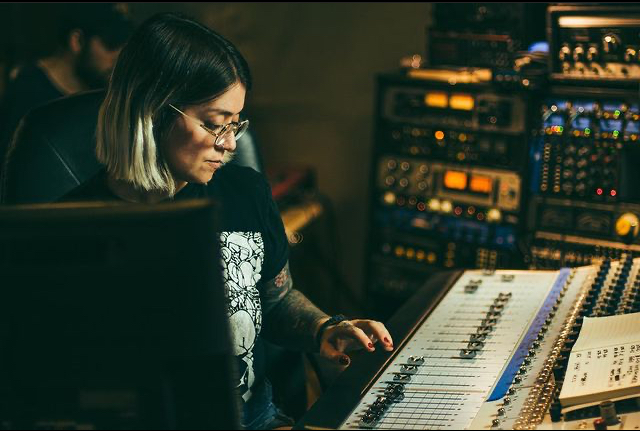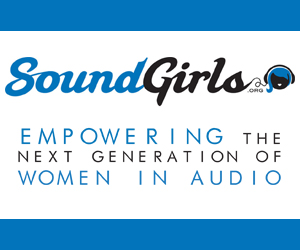
By Luciana Garcia
Victoria Paz Cordero is a Chilean producer and audio-engineer based in Santiago, Chile. She has made quite a name for herself in the local music scene. She has worked with many big names like Ases Falsos, 31 Minutos and Felipe Schuster. But more importantly, she has served as a channel for women and non-binary people to make music.
My main objective upon entering this interview was to understand her “why”. Why does she make music? What fuels her creativity? What is her driving force? Read on to find out.
Connect with Victoria here –
Listen to her work: tinyurl.com/victoriacorderoplaylist
Follow her on Instagram: https://instagram.com/victoriapazcordero
Email her at victoriacorderoaudio@gmail.co
WiMN: Hello Victoria, thank you so much for joining me. I’d like to start by asking how did you end up here? Tell us a little bit about your beginnings as an audio-engineer and producer.
Victoria: I was born and raised in Punta Arenas and I was always doing something with music. I started playing in bands when I was in school, local festivals and such. I moved to Santiago when I graduated school. At that moment, I started taking it more seriously.
I started getting more interested in studios, recording and producing. When the moment came to start practicing my craft, I went to this studio called Agartha, where a friend, Felipe Castro, was interning. I asked if I could intern too and it worked out.
I started having more direct contact with the studio, I began doing my own productions and so on. Then everything started playing out naturally until the moment I started working with bands more seriously.
In 2018, I got a scholarship from Becas Chile to go to Los Angeles, CA. I did an audio-engineering program at Musicians Institute in Hollywood. When I came back, I could feel the change in the demand for my work. I started getting more gigs, more people trusted me to produce their music, I got more jobs as a mixing engineer and that is where I have spent most of my professional life.
Last year, I was nominated for the Pulsar awards for producer of the year. It was very humbling for me, as I was the second woman to be nominated. The first was Javiera Mena. More than the prize itself, that helped to visibilize my work as a woman in a strongly male-dominated field.
WiMN: Feminism seems to be very important to you, I have seen how you apply it to your career. Talk to me about how you practice your feminism.
Victoria: Truth is, I have always felt very identified with this ideology since I was very little. It is important to me to open spaces in music that aren’t male dominated, because, in a certain way, if you don’t masculinize the way you carry yourself in the field, you are
placed in the back. That is changing very quickly, and it was especially true when I began my career.
I love sharing what I know with women and LGBTIQA+ people. I don’t feel like I am excluding men in any way because well, I am a heterosexual cis-woman. It isn’t my
objective to become a thought leader on this, it’s just a fact that I have witnessed a lot; women and dissidents feel a lot more comfortable asking me the same thing they could ask a man but they feel shame. Truth is, there is no shame in not knowing.
Ideally, I would like to work mainly with women and dissident people because it is a point of view we haven’t heard enough. It is important to ask ourselves; how is my art going to change if it is produced by a woman or a LGBTIQA+ person? It’s just a different perspective and art is directly related to who the creator is. So I always encourage people to work with women and non binary people.
We have been hearing men’s perspectives for way too many years. Let’s use the fact that feminism is at an all-time-high to put it into practice. We have spent many years in the idea of feminism. Men have told me “well yeah, we have been waiting for women and non binary people to appear” but all you have to do is go and find them! We are here. I like to spike that curiosity in working with us.
Everyone can learn and it is very important to me that people know that. It is not a threat to me that other people know the tools and techniques I use for production. That someone knows how I do things doesn’t mean someone’s going to replicate my work and take away jobs from me. That’s simply not going to happen. What’s going to happen is that they’ll start finding their own tools and techniques.
I think it’s time we start seeing production as its own art form and someone’s art is never identical to another. Art made by women and non binary people is always different. Always different.
WiMN: I love your perspective of educating and amplifying unheard voices, it doesn’t leave anyone out, only expands into new horizons. No one loses if you educate and amplify women and non binary people.
Victoria: The thing is, men in general are more comfortable asking questions, standing up in a group and stating what they need to learn. Also, it’s full of cis-men who can answer the questions of other cis men. Therefore I will prioritize the questions sent to me by women and non cis people.
It’s happened countless times; someone comes up to me with a question and they state how afraid they are to ask because it is a “dumb question”. A question is never dumb or intelligent; a question is just a question. Actually, when I began studying recording, I had never recorded a track in my life. So yeah, you can learn too.
WiMN: I respect the way you apply your activism into your own work and daily life. You truly live up to your beliefs, it is truly inspiring.
Victoria: Thank you. Yes, no one is asking anyone to make enormous changes. If we want things to change, we can start with very little gestures, for example, trying to consume more music created by women and non binary people.
I don’t think this is spoken about enough but at least I feel a lot more represented when I listen to a woman’s music. There is a resonance with me that I don’t find in the millions of love songs created by men.
It is packed with music by women and non binary people who are offering refreshing messages in a very clear way. They are there, we don’t have to deep dive search for it. It is not minorities’ homework to make themselves visible. Those of us in privilege can go and search. It is all there.
And yes, I am working all the time. All the time. So I don’t have a lot of access to attend assemblies and be part of big organizations so all I can offer is my knowledge and my platform to minorities that want it. Being able to offer those tools in a very accessible way makes me feel good. When I get messages from people saying they feel comfortable asking me, I love it.
WiMN: I wanted to ask a little bit about what you are working on today and what are some of your future goals?
Victoria: Honestly, my entire year is pretty much planned. It’s the first time that happens. A lot of projects are coming. Most of them have to do with women and non binary persons as well as opportunities for learning, which I am very excited about.
I am working in post-production for a show about Los Prisioneros, I am producing with Las Brumas- a Berlin based artist. It has been interesting to work with her remotely. I have learned a lot. I am also producing Noah Blanco’s debut LP, a non binary artist from Chile. There’s just a lot happening!
WiMN: Definitely a lot! That is great news. I love that you are working on projects you enjoy and that you can make that choice.
Victoria: Yes, I am very grateful. That is a very important awareness for me to have. This demand for my work means there are a lot of people that want to work with me. I am a freelance producer, which means my entire livelihood depends on people wanting to work with me and I am very grateful that I get to do what I like.
What I like is art, expression, people who are comfortable being vulnerable, transmitting a message with no filter. I feel women and non binary persons have something to say about that. We have been fighting for a long time, resulting in an ability to speak your truth that is beautiful.
WiMN: Thank you so much for speaking with me. My purpose with this interview was to understand your why, what drives you. You explained it to me and I am absolutely fascinated. Thank you again!








